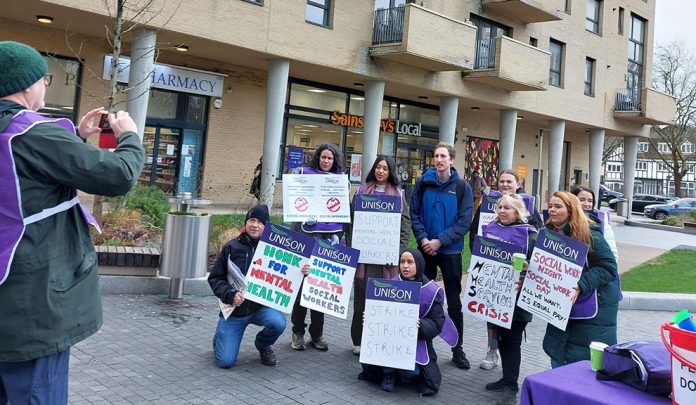Hugo Pierre, Member of Unison Local Government Service Group Executive, personal capacity
Over one million local government workers and others on National Joint Council (NJC) terms and conditions have faced more than ten years of below-inflation pay rises. For many, this has meant the value of their pay is now worth 20% less than it was back then – effectively that means they are working an extra day on no pay!
The largest union in the sector, Unison, has just finished a consultation exercise among its members for the pay claim that is due from 1 April 2024. The last two years have seen most NJC unions accept a flat-rate increase of £1,925. This below-inflation increase was rejected by Unison and Unite members in ballots for national industrial action. However, they only passed the Tory anti-union 50% turnout threshold in a small number of branches.
Lambeth and Knowsley Unison were the only two large Unison branches covering top-tier local authorities that got over 50% of their branch members to vote in the ballot.
Strategy to fight on pay
Knowsley branch, where Socialist Party members play a role in leading the branch, argued that the union should start industrial action in those areas, while teachers in the National Education Union (NEU) and others were on strike, and reballot a number of other branches that narrowly missed the threshold.
At that stage, this was rejected by the ‘Time for Real Change’ left coalition leadership of Unison’s Local Government Service Group Executive (SGE). Unfortunately, the leadership of the NEU recommended teachers settle their pay claim soon after.
This time round, Unison members have agreed a claim for £3,000 or 10%, £15-an-hour minimum pay within two years, and joint monitoring of ethnicity pay gap information. Unison’s NJC committee is now approaching the other NJC trade unions – Unite which has consulted on and agreed a similar claim, and GMB which is still consulting – to submit the joint claim at the end of February.
Demands on Labour
It is unclear what the employers’ response will be at this stage. It is more than likely they will call for a lower offer this year, as even the higher measure RPI inflation fell to 5.2% in December. However, this is an ideal time for the unions to mobilise for above-inflation pay increases to get back some of the last decade’s lost pay.
All three of the trade unions back Labour. Labour councils now make up the largest bloc on the employers’ negotiating side.
Unison members know only too well that, in councils, Labour has failed to defend their jobs over the last 15 years of austerity. It is estimated that one million local government jobs have been axed during this time. And now some Labour councils, alongside some Tory councils, have handed over political control to unelected officers or commissioners to make more swingeing cuts under Section 114 provisions.
Unison members should demand that Labour councillors pay up and end the cost-of-living crisis we have endured for over a decade. But this demand will not be heard unless the Unison leadership mobilise a campaign that engages the mass of the membership for action. A serious discussion must take place throughout the union to support the best practice that can push more branches over the 50% turnout threshold.
Fighting cuts and section 114
Some members may be concerned about losing their jobs, especially as they have seen some councils facing serious financial straits. The largest council in western Europe, Birmingham City Council, was recently put under Section 114 measures.
So far, the trade unions nationally have not given backing to a plan of action to win more resources for the council, or demanded a commitment from an incoming Labour government to provide the resources they need.
The fight for council funding, where Unison’s own estimates show that £3-4 billion is needed now in England alone, must be a part of the campaign. Instead of pledging to cooperate with unelected Tory government-appointed commissioners,
Unison should demand that councils refuse to pass on the cuts and join with unions in a campaign to demand the funding necessary. Unfortunately, when Socialist Party members proposed no-cuts budgets at the recent SGE meeting it was not supported – including by Socialist Workers Party members.
Unison, for example, should give a firm commitment of support to branches like Nottingham Unison, which has pledged to fight any cuts, with resources for action. Unison could organise a national meeting of all affected branches to coordinate a campaign against the slaughter of jobs and services.
And, like Unite have done with steelworkers facing the decimation of their industry in Port Talbot, try to force a commitment from Labour to end the funding crisis.
This year’s local government pay claim could be a major turning point for Unison. A plan of action could draw in new layers of activists, just as other unions have seen, and revitalise the union into a fighting force. This could force concessions now from the employers but also prepare the ground for campaigns in the future to defend jobs, pay and conditions of local government workers under a Starmer-led national government.
The following Socialist Party members are seeking nomination for the 2024 Unison service group elections
Local Government Mathew John, Angie Waller
Health Steve Bell, John Malcolm, Adrian O’Malley
Community Helen Couchman
Police and Justice Amy Sage
Angie, Steve, John and Adrian are all sitting SGE members







